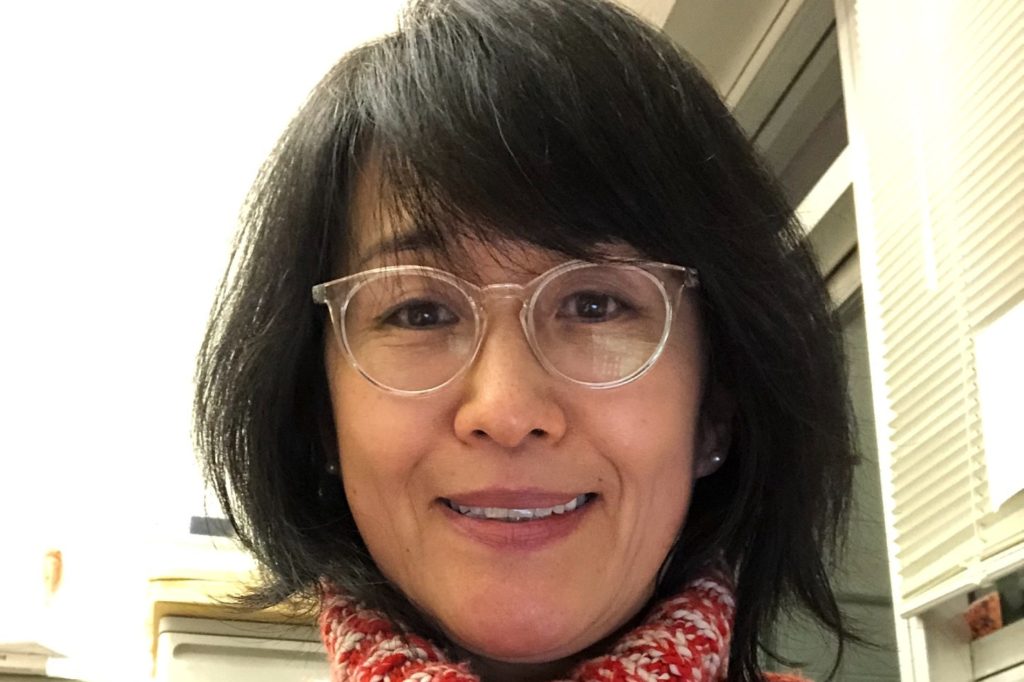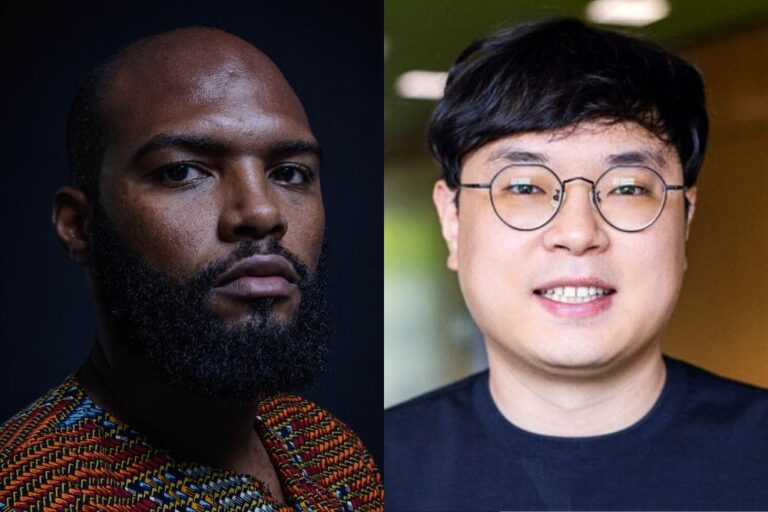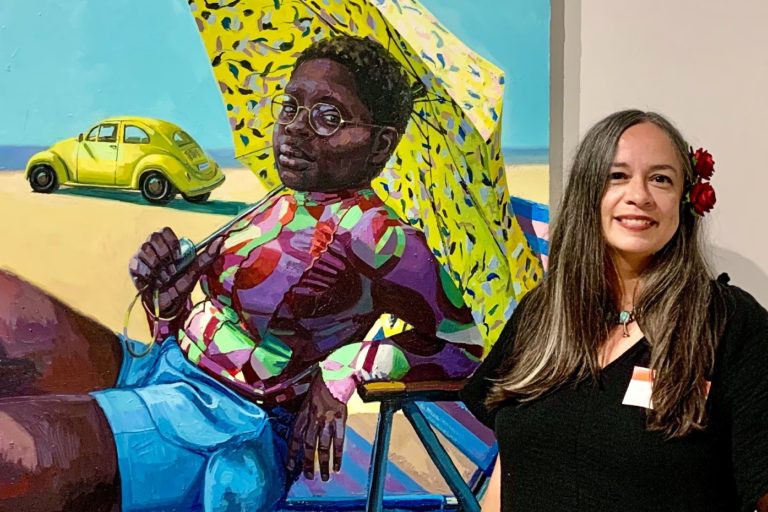Born and raised in Seoul, South Korea, Michigan State University Professor Jae Won Lee returned to her native country as a Fulbright Scholar during the 2022-2023 academic year to further her research and to teach. And, thanks to an extended research leave following her Fulbright experience, she has crisscrossed the globe to participate in artist-in-residence programs with Tainan National University of the Arts in Taiwan (January 2023); L’Imprimerie, Collaborative Project GodelLee with Sylvie Godel in Lausanne, Switzerland (February-March 2023); and the Archie Bray Foundation in Helena, Montana (March-April 2023), before returning to MSU.

The Fulbright Program is the U.S. government’s flagship international educational exchange program, offering scholars professional and research opportunities. Lee also was a Fulbright Scholar in 2016 when she went to China to pursue her research in ceramic art and where she explored a viewpoint of mountainous landscape.
Primarily a ceramicist, Lee focuses on creating intimate-scaled, reductive, sealed porcelain box forms, as well as porcelain sculptures shaped by numerous small multiple components of nuanced whites and off-whites and assembled into a large singular unit. However, in recent years, she has extended her material explorations to fibrous materials.
“My work tends to convey Asian aesthetics in general and Korean nuance in particular. I don’t intentionally mean to do this. It’s an innate part of me.”
“My work tends to convey Asian aesthetics in general and Korean nuance in particular. I don’t intentionally mean to do this. It’s an innate part of me,” she said. “I’ve done a great deal of work with floral motifs. But then I began to appreciate winter landscapes in Michigan – very sheer and serene, horizontal in its solitude. That really influenced me to explore quietude in my work. I love winter, snow, frost, ice.”
Focusing on Fiber Art
Lee’s favorite medium is porcelain and the beautiful, translucent sheen that is produced when porcelain is fired at high temperatures of about 2380-2480 ° F. However, since she has developed a sensitivity to airborne allergens like dust and mold, which are components of clay, she has explored other mediums and wanted to learn more about Korean traditional fiber art-making techniques and processes. She decided to begin the highly competitive process of applying for another Fulbright award in her home country focusing on fiber art, a rich Korean tradition that has continued to evolve since ancient times.

Her Fulbright experience started in June 2022 and ended in January 2023. During this time, she learned to work with natural dyes made from onions, leaves, flower petals, and other organic ingredients. She embroidered patterns on various fabrics made of cotton, silk, or ramie and experimented with needlework on cotton-based paper, creating countless parts for larger collage creations. Some of the pieces Lee worked on are finished, but many are ongoing. She plans to complete all the work for exhibitions in Philadelphia in Fall 2023 and Tucson, Arizona, in Spring 2024.

During her most recent Fulbright experience, Lee gave lectures at six different universities, taught a graduate seminar in ceramics and textiles, and co-taught a fiber arts class to undergraduates at her host university, Chungnam National University in Daejeon.
From Psychology to Art
According to Lee, being in Korea brought back beautiful memories of her family and her native country. Her father, who studied in America in the ’60s and ’70s, sent Lee and her siblings to the United States for their higher education. Lee originally majored in Psychology but ended up receiving a BFA in Sculpture from California State University, Long Beach, in 1991 and an MFA in Ceramics from New York State College of Ceramics at Alfred University in 1995.
“I wanted to know the human mind better,” she explained. “However, at one point, I took a drawing class as an elective to get an easy grade, but it really changed my path. Slowly, I kept taking more art classes and eventually changed my major to art. But art is about our inner minds, so in a broader sense it’s all connected.”

Lee worked as an Adjunct Instructor at several schools, including the University of Washington in Seattle, before joining the Department of Art, Art History, and Design at MSU in 1998 where she teaches ceramics to graduate students and art foundation courses (basic drawing, color and design, and three-dimensional design) to undergraduates.
She has been an artist-in-residence and visiting artist at numerous locations all over the world, including Clayarch Gimhae Museum in Gimhae, South Korea; Anderson Ranch Arts Center in Snowmass Village, Colorado; Cranbrook Academy of Art in West Bloomfield, Michigan; European Ceramic Work Center in Oisterwijk, Netherlands; Chitraniketan Residency in Kovalam, India; Guldagergaard International Ceramic Research Center in Skælskør, Denmark; Watershed Center for the Ceramic Arts in Newcastle, Maine; The Pottery Workshop in Shanghai, China; Chungnam National University in Daejeon, South Korea; and The Clay Studio in Philadelphia, Pennsylvania.
“The U.S. has offered me all these opportunities and I am ever more grateful to MSU for the research incentives and awards over a 25-year period. In this country, if you work really hard, doors open.”
The opportunity to experience diverse studio practices in various parts of the country and the world has enabled her to transfer expanded perspectives to the classroom. That’s why Lee encourages her graduate students to participate in resident artist programs.
“It’s a great way to ‘unlearn,’” she said. “You need to unlearn a lot of what you’ve been taught in order to find your own vision and voice and test yourself as an artist. That’s when you really start learning about yourself in a self-guided and uninterrupted studio setting.”

Lee has exhibited her ceramic sculptures and paper/textile work in numerous national and international exhibitions. Now back at MSU, with a HARP Production Award, she is working on image collection and a few articles for a bilingual art catalog that will chronicle her Fulbright artistic endeavors and at other locations she has worked for the past two years.
“The U.S. has offered me all these opportunities and I am ever more grateful to MSU for the research incentives and awards over a 25-year period,” she said. “In this country, if you work really hard, doors open.”
Written by Lynn Waldsmith


